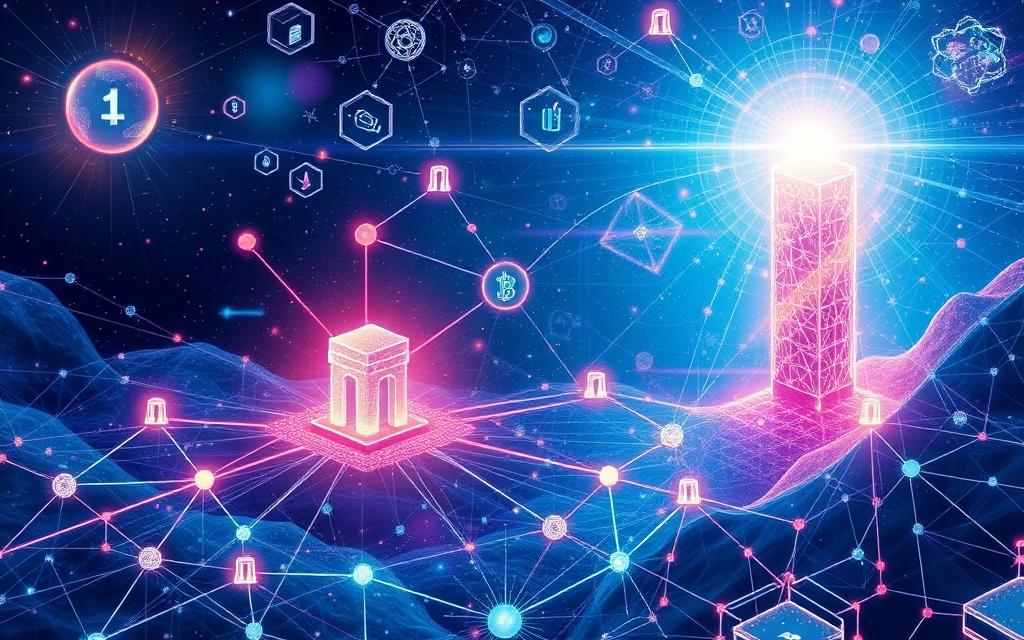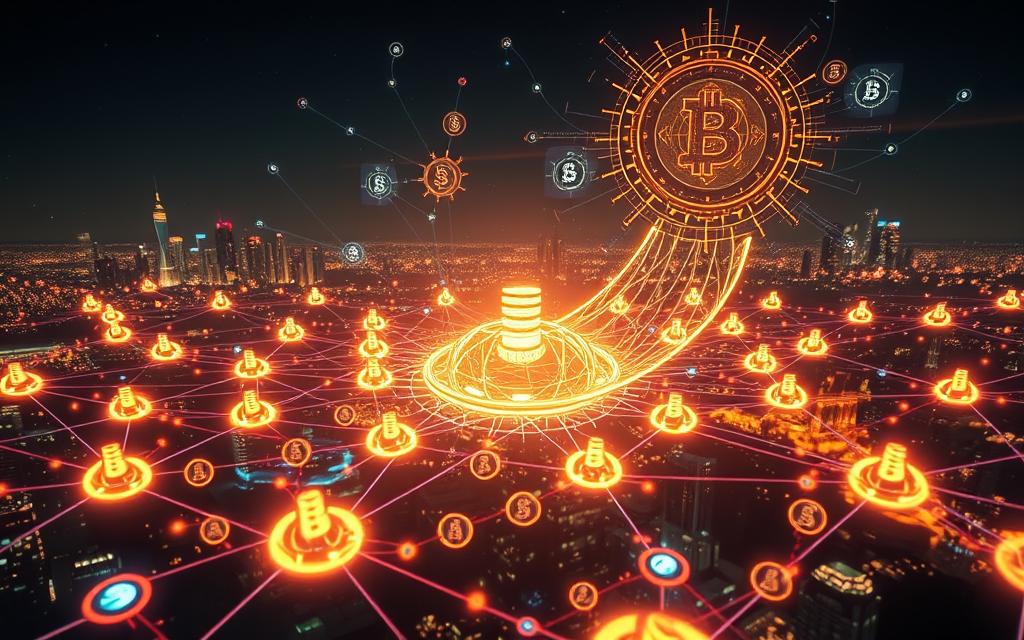Imagine a world where everyone has a say in how things are run. No more just a few people making all the decisions. This is what Decentralized Autonomous Organizations, or DAOs, are all about. They bring a new way of making decisions, one that’s open and fair to everyone.
At the heart of DAOs is a system where every decision is recorded on the blockchain. This means every vote and action is permanent and visible to all. It’s a system where everyone works together, not just a few leaders. This is how DAOs are changing the way we think about power and decision-making.
DAOs are not without their challenges. They face issues like growing too big and dealing with laws that don’t understand them. But they keep pushing forward, showing us new ways to work together. They’re like a group of people from all over the world working together towards a common goal.
Key Takeaways
- DAOs empower individuals with decision-making rights through a shared, blockchain-based platform.
- Transparency is at the forefront, with all DAO actions recorded on a transparent ledger.
- Smart contracts are the backbone, enabling automated governance and the execution of collective decisions.
- The scalability, coordination of governance, and legal compliance remain as challenges for DAOs.
- Active member engagement is vital for the sustainability and success of any DAO.
- Though faced with hurdles, DAOs represent a significant breakthrough in the Web3 ecosystem.
The Emergence of Decentralized Autonomous Organizations in the Digital Epoch
Decentralized Autonomous Organizations (DAOs) have changed how we think about organizations. They are based on decentralized governance. This change is thanks to blockchain technology, which is key to DAOs.
In this digital age, DAOs are leading the way. They challenge old business models with a new, open way of making decisions. This approach promotes transparency, inclusivity, and collective decision-making.
DAOs mean more than just new tech; they change who holds power. They give power to many, not just a few. This makes decisions more democratic and fair.
Also, DAOs can work fast and securely thanks to smart contracts. This is important in today’s fast-changing digital world.
Understanding the Digital Revolution Triggered by DAOs
DAOs are a big step forward in how we think about organizations. They start a digital revolution that changes how we participate and lead. Blockchain technology makes this possible, allowing people worldwide to work together.
DAOs can change many areas, like finance, governance, and content creation. They show how new ideas can shake up old ways of doing things.
Blockchain as the Bedrock of DAOs
Blockchain is at the core of DAOs. It makes sure things are open and safe from tampering. Smart contracts are key here, setting rules and automating tasks.
This makes things run smoother and saves time. It lets DAOs focus more on growing and innovating.
The Shift from Traditional Governance to DAO Models
DAOs move us from old governance to new, decentralized ways. They use smart contracts to let everyone have a say. This includes voting, proposing ideas, and delegating tasks.
This change brings fairness and equality to organizations. It shows the values of our digital age.
Core Principles of DAOs and Their Operative Mechanisms
The rise of Decentralized Autonomous Organizations (DAOs) is changing how we govern. They focus on core principles of DAOs to change old ways. These principles help in decentralized governance and ensure all actions are open to check.
Exploring the Framework of Decentralized Governance
Decentralized governance is key to DAOs. It gives power to many, not just one. This way, DAOs can work freely, without being tied to one place or group.
They use consensus to make decisions. This means everyone’s voice is heard, making sure decisions benefit many.
Transparency and Trust Through Blockchain Technology
Blockchain transparency is vital for DAOs. It keeps all actions safe and open. This builds trust and makes sure everyone can see what’s happening.
This openness is important for accountability and for DAOs to be recognized legally.
Tokenized Voting Mechanics in DAO Participation
DAOs use tokenized voting mechanisms to decide. Voting power goes to those who own tokens. This makes sure everyone has a say and works for the DAO’s success.
Statistics show 10% to 20% of voters are active. This shows people are really involved in DAOs.
Decentralized Autonomous Organizations, DAOs, Web3 governance
Decentralized autonomous organizations (DAOs) are changing how we make decisions online. They use Web3 to let everyone have a say, unlike old-fashioned companies. DAOs are all about giving power to the people, thanks to smart contracts that make rules without needing humans.
Participatory Governance in the Age of Web3
In DAOs, everyone gets a vote, thanks to tokens. This makes everything open and fair. Unlike old ways, DAOs show all their moves on the blockchain, building trust.
This new way makes DAOs strong and keeps them going. But, you need to know some tech to join in. This makes sure everyone can help out and understand the DAO.

Decentralized Autonomous Corporations vs Traditional Enterprises
DAOs and old companies are worlds apart. DAOs are flexible and work all the time, everywhere. This makes them fast and open to new ideas.
They’re all about working together and solving problems in new ways. This is a big change from old companies that are slow and stuck in one place.
| Feature | DAOs | Traditional Enterprises |
|---|---|---|
| Decision-making Structure | Decentralized, based on token holder voting | Centralized, hierarchical |
| Operational Transparency | All actions are recorded on blockchain | Limited disclosure based on regulations |
| Flexibility and Scalability | High, operates 24/7 globally | Limited by office hours and geography |
| Community Engagement | High emphasis on participatory governance | Varies, often limited to shareholders |
| Adaptability to Change | Rapid, due to distributed consensus | Slower, due to bureaucratic processes |
DAOs are changing the game in Web3. They show how old ways don’t fit in a digital world. DAOs are leading to a fairer business world, where everyone has a say.
DAO Governance Models: An Analysis of Structures and Efficiency
The move from old to new governance in DAOs is big. It’s a shift towards more democracy and growth. This change moves away from old, top-down systems to new, decentralized ones using blockchain.
From Hierarchies to Flat Governance: The DAO Approach
The change to flat governance in DAOs is impressive. It makes decision-making more open to everyone. DAOs give everyone equal say, making things fair and fast.
Recent numbers show over 13,000 DAOs with 11.1 million token holders. This shows the trend is growing.
Smart Contract Governance Frameworks and Their Implications
Smart contracts are key to DAOs, making rules and actions automatic. This cuts down on middlemen. But, it also raises concerns like centralization risks.
For example, MakerDAO and Compound use tokens for voting. This can lead to issues like voter apathy and centralization, affecting fairness.
Looking at 100 DAOs, we see different uses of these frameworks. Some DAOs focused on infrastructure or investment are more centralized. This is because fewer people hold more tokens.
On the other hand, DAOs focused on social or public goods are more decentralized. They have lower Gini coefficients, showing more equality.
Gini coefficients help track decentralization in DAOs. They give insights into how fair and effective DAO governance is.
As DAOs grow, understanding smart contract governance is key. We must tackle risks like token concentration. We need to make sure governance is fair and includes everyone. The future of DAOs depends on finding this balance.
Challenges and Evolution of DAOs Within the Web3 Communities
The evolution of DAOs is changing how digital communities work and make decisions. These changes are happening in the world of Web3 communities. As DAOs grow, they face many DAO challenges that test their strength and ability to adapt.
DAOs aim to change how people participate in decision-making. They try to balance growth with good governance. With 87% using smart contracts, they face growing complexity. This makes it harder to keep decision-making fair and open.
Despite their promise, 68% of DAOs don’t fit into traditional legal systems. This makes it hard for them to work well in the current economy. They need new legal solutions that fit their decentralized way of working.
Most DAOs, 92%, use tokens for decision-making. This shows how they value member participation. But, it also brings challenges like coordinating actions and making decisions efficiently. This is seen in the 45% of DAOs that rely on algorithms for all decisions.
| Statistic | Details |
|---|---|
| 87% utilize smart contracts | Highlighting the reliance on blockchain technology for operational rules |
| 68% lack legal recognition | Challenges in interfacing with traditional legal frameworks |
| 92% use tokens for governance | Indicative of decentralized participation and voting systems |
| 45% are algorithmic DAOs | Entire governance handed over to software, raising scalability concerns |
DAOs are moving towards better governance structures. This is a sign of growth in the ecosystem. It’s important to keep people involved and engaged. This is shown by 32% of DAOs working in traditional businesses.
In summary, the evolution of DAOs in Web3 is a big change in digital governance. How well DAOs can grow and adapt will shape their future. Through constant improvement and solving problems, DAOs can change how we work together.
Case Studies: Successful DAOs Revolutionizing Industry Paradigms
Successful DAOs are changing how we govern today. They are making big changes in finance and tech. These changes are thanks to DAOs in DeFi and sustainable tech.
Exploring the Success Stories of Pioneering DAOs
MakerDAO is a great example. It created the stablecoin DAI. This DAO lets people vote on important decisions with MKR tokens. This shows how DAOs can keep things stable and grow.
Aragon helps make DAOs work on Ethereum. It lets companies choose how they govern. This makes DAOs fit different needs, changing how we work.
MolochDAO is another success. It pools funds and votes on projects. This fast way of funding helps new tech grow quickly.
Lessons Learned from DAO Implementations
DAOs are changing how we do business. About 60% of new DAOs focus on green tech. This shows they’re working with global goals.
DAOs in DeFi, like Aave and MakerDAO, show how they work. They make finance services better by involving everyone. This makes them strong and flexible.
Tokenomics is key to DAOs. It keeps people involved. DAOs are moving away from old ways to new, open ones. This brings more honesty and responsibility.
DAOs are getting better all the time. They’re ready for the challenges of today’s finance. They might even work with old banks and other blockchains soon.
Conclusion
Decentralized Autonomous Organizations (DAOs) are more than just a trend. They show us the future of DAOs, leading to a more democratic and fair digital world. They use blockchain and AI, making them leaders in new governance models.
These models are all about being open, fair, and automated. They help make decisions more democratic, cut down on corruption, and make managing organizations easier. This is true in areas like blockchain, AI, and finance.
DAOs are changing how we govern, thanks to their use of predictive analytics and voting systems. Projects like Aragon, DAOstack, and SingularityNET have shown what DAOs can do. We expect to see more of these advancements in the future.
As we work on making DAOs better, we’ll see more AI and clearer rules. This will help make decision-making fairer and more open worldwide.
DAOs promise to change how we think about governance and how we create value in society. They’re ready to help solve problems in the Web3 world. They aim to make governance fair, open, and innovative.
